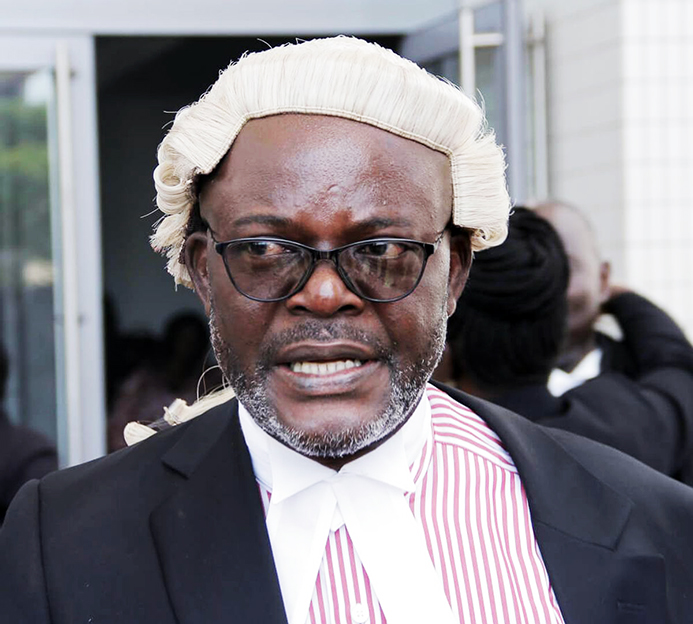
The US$1.5 million defamation suit filed by Nana Oye Bampoe Addo against her ex-husband, Anthony Lithur, has been dismissed by the General Jurisdiction of the Accra High Court, presided over by Justice Joseph Adu Owusu-Agyeman.
The application was dismissed on Monday, May 27, 2024 for not disclosing any cause of action and a cost of GH¢5,000.00 awarded against Nana Oye Bampoe Addo, the plaintiff.
Justice Owusu-Agyeman ruled that the entire pleadings as contained in the plaintiff’s writ of summons were premised on the divorce petition filed by Mr Lithur, defendant in the dismissed application.
According to the court, the plaintiff, previously known as Nana OyeLithur, could not substantiate the claim that the defendant leaked the petition to the media, particularly when the petition and reply are court documents and accessible to the public.
The court indicated that during the hearing of the petition, the plaintiff could have applied for those portions she now claims are defamatory, to be expunged from the record.
Justice Owusu-Agyeman added that, if the application is allowed, it will open the Pandora box for parties in suits, and that no court should entertain such cases.
The court also added that with the advent of internet and social media, access to information has been made easy.
Following the dismissal of the case, Agyenim Agyei-Boateng, holding brief for Sarfo Buabeng, counsel for Mr Lithur, asked for a cost of GH¢20,000.00.
Edward Danquah, counsel for the plaintiff, rebutted that they still believe they have a case, therefore, they could only offer GH¢1,000.
However, the court ruled that Nana OyeBampoe Addo gives her former husband GH¢5,000.
Arguments
Agyenim Agyei-Boateng, holding brief for Sarfo Buabeng, had earlier told the court that the application before it was for an order to strike out plaintiff’s pleadings and to dismiss the suit against the defendant.
He said the contention of the applicant was that the plaintiff’s writ of summons and statements of claim filed on April 25, 2024 did not disclose any reasonable cause of action against the defendant.Also, that the pleadings are frivolous, vexatious and an abuse of the court’s process.
According to him, the plaintiff filed the action for defamation, but clearly on the face of her pleadings, the entirety of the action is premised on facts contained or averred to in the divorce petition filed by the defendant.
The plaintiff’s respondent makes copious reference to the petition and to the reply filed by the defendant applicant herein.
The defence counsel referred the court to paragraph 6-28 of the Plaintiff’s statement of case, all of which refer or relate to matters contained in the defendant’s petition and reply.
The law is clear that an action for libel or any action for defamation does not lie where the basis of the action is in matters contained in judicial processes and procedures.Counsel referred the court to Hlasbury’s laws of England 4th edition, page 47 paragraph 96
According to him, “what the authors are saying is that no action lies, whether against judges, counsel, jury, witnesses or parties for words spoken in the ordinary cause of any proceedings before any court or judicial tribunal recognised by law.
“The privilege extends to documents properly used and regularly prepared for use in the proceedings, advocates, judges and jurors are covered by this case
“What the authors are telling us, which would be of a persuasive authority to this court is that the content of judicial processes are covered by privilege and, therefore, a party is immune for an action in a defamation contained in those judicial processes.
“I want to refer a ruling of this High Court in April 30, 2009 titled Obaapanin & Afua Mireku vs Kwaku Baah AD1/2009.
“In his ruling, the learned justice referred to clerk and Lindsell and Torts (16th Edition). Read(…) It is not a desire to prevent action from being brought in case.
“The point being made before you today is that to the extent that the whole of plaintiff’s action is grounded on matters contained in judicial proceedings and processes, the law does not support the action and in fact there is no action in law against the defendant applicant.
“My lord, by a ruling dated May 31, 2021 the High court had the opportunity to determine a matter, which falls on the matter before you this morning. I refer my lord to Shantel T.S Kudjawu vs Gloria Assam Arhin suit number DJ0535/2021.”
Therein, the plaintiff sues the defendants for an action for libel, claiming that the content of the defendant’s divorce petition were libellous.
It is apparent without recourse to anything more than the plaintiff’s own statements of claim that the instant action seeks to hold liable the defendant applicant on matters which are privileged and for which an action cannot lie in law. The instance suit, therefore, discloses no reasonable cause of action under the law against the defendant. It is the very definition of an abuse of the courts process. We humbly submit.
The plaintiff’s argument
We are opposed to this application. And our position is both procedural and substantive. This application is incompetent, defective and not properly before the court
This is an application that sought to strike out pleadings. The position of law is that the notice of motion invoking the jurisdiction of the court must clearly indicate which pleadings are sought to be struck out, before the court is invited to dismiss, stay or enter judgement, as the case may be.
Refer to Morrison and Another vs Victory Bible Church and Others 2014/16 2SCGLR, stated at page 1,628 where the court, per Gbedegbe JSC —Reading (…)
On the face of the application before this court, no pleadings have been attached to be struck out. Not even a single one. So far as this is missing on the face of the motion and on authority of the case cited above, we state that the court’s jurisdiction has not been properly invoked. We pray that the application be struck out on this ground alone.
Now, to the substance of the application, this application has been brought under order 11 rule 18…on the authorities in such matters, the pleadings complained of are deemed to be true and the court’s enquiry is to ascertain whether on those pleadings, which are true and a cause of action can be grounded.
In applications of this nature, the truthfulness are assumed and are conclusive of the application. It is for the court to determine whether on the basis of the pleadings there lies a reasonable cause of action against the defendant. This position was again reaffirmed by the Supreme Court.
It is our submission that the suit, as filed by the plaintiff, disclosed a reasonable cause of action. On the definition of reasonable cause of action, I will refer the court to Ampretwum Manufacturing Limited vs Divestiture Implementation Committee reported in 2019…
We submit that even though generally at Common Law, judicial proceedings are absolute privilege, there are exceptions to it that absolute privilege cannot be upheld.
One of these instances are where the matters are taken out from judicial proceedings. The position of the law is that when the matters are taken out of the judicial proceedings they are not covered by absolute privilege, even though the court at page 5 of the judgment affirms the common law position of absolute privilege.
If you look at our statement of pleadings, it is not about the publication of the matter in the divorce proceedings, but it is about the subsequent publication in the media.
Our complaint is not about the publication of the divorce petition in the media per se, it is about the publication and dissemination on the media and internet. I will refer you to the specific paragraphs on the statement of claim, paragraph 9, plaintiff says reading(…)
Our submission is that in so far as the defendant caused that publication outside the court proceedings, it is not caught by absolute privilege and, therefore, actionable and discloses reasonable cause of action.
Our second submission on the substance of the application is that, in the face of the 1992 Constitution, any notion on Common Law privilege that seeks to absolutely protect or make new any wilful, deliberate and malicious conduct, which denigrates a person, from action by that person to vindicate their rights, is inconsistent with and contravention of article 15(1)(2) (b).
A person cannot, in the face of these constitutional provisions, be allowed to wilfully, deliberately and maliciously defame someone and so affect their dignity and reputation in the face of right thinking members in the society and seek to shield themselves under a notion of absolute privilege propounded in the 17th century
We submit that such a notion of absolute privilege will be unconstitutional and to that extent null and void. We submit that the plaintiff has adequately by the statement of claim demonstrated the existence of reasonable cause of action, which this court must proceed to hear and determine.
It is our submission that the two decisions of the two coordinates cited to you is of no binding effect and at best is of persuasive value.
The Shantel Kudjawu case is not binding authority and it is not in accord with the laid down principles concerning the matters as arise there and this court should not be led to fall into the same pit.
We submit that the instance application as has been shown here, is procedurally incompetent and, therefore, not properly before this court.
We also state that it is substantively of no value and we prayed that the instance application be dismissed for the suit to be heard.








